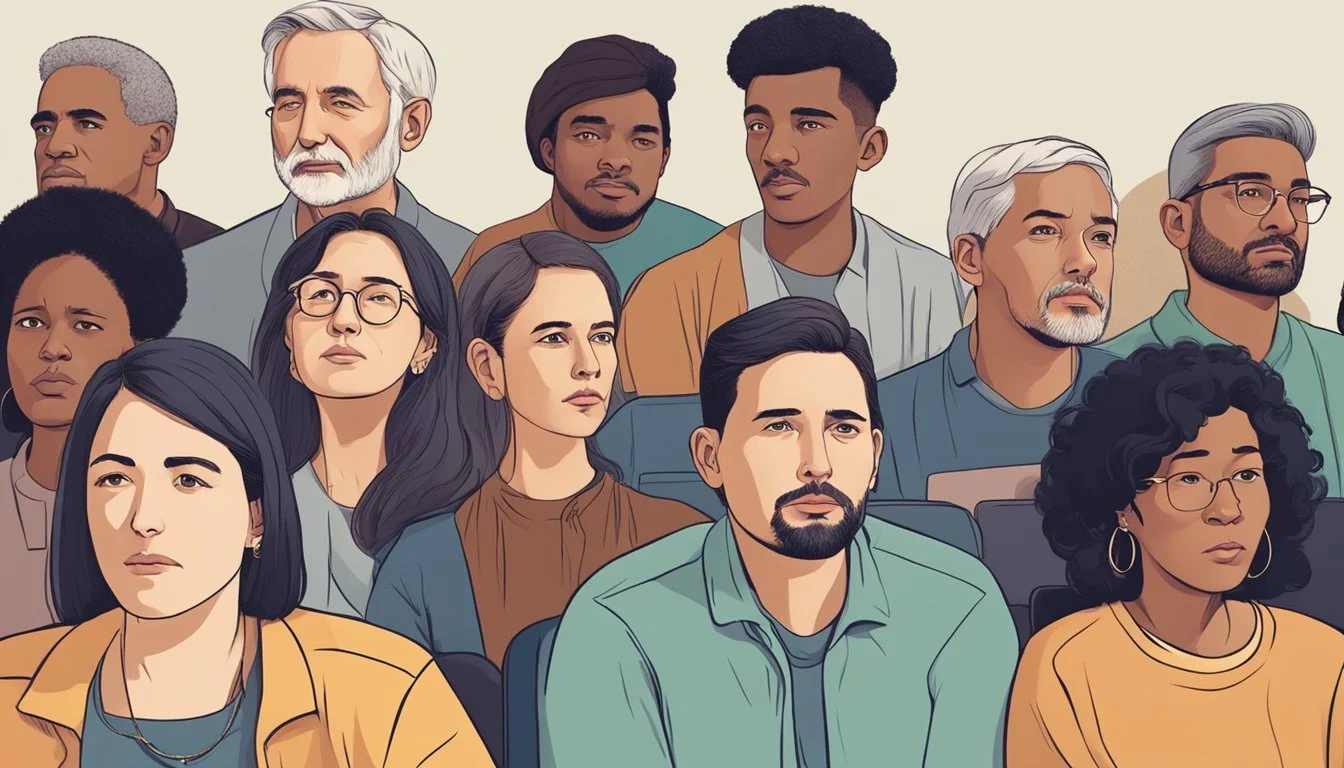One of Us: The Heart-Wrenching Journey of Ex-Hasidic Jews Revealed!
"One of Us" is a gripping 2017 documentary that offers a rare glimpse into the lives of three ex-Hasidic Jews from Brooklyn. Directed by acclaimed filmmakers Heidi Ewing and Rachel Grady, the film chronicles the challenges faced by individuals who choose to leave their ultra-Orthodox communities. The documentary provides an intimate look at the trauma, anxiety, and potential dangers these former Hasidic Jews encounter as they navigate life outside their insular world.2
Netflix financed and distributed "One of Us," which premiered at the Toronto International Film Festival in September 2017. The film combines archival footage with firsthand accounts to create a powerful narrative that explores themes of identity, faith, and personal freedom. Ewing and Grady, known for their previous work on "Jesus Camp," bring their signature storytelling style to this complex and often emotionally charged subject.
The documentary has received critical acclaim for its honest and empathetic portrayal of its subjects. It sheds light on the difficulties of leaving a tightly knit religious community and the struggle to forge a new identity in the secular world. "One of Us" raises important questions about the balance between individual autonomy and communal belonging, making it a thought-provoking watch for audiences interested in religion, culture, and human rights.
Documentary Overview
"One of Us" is a 2017 documentary feature film directed by Heidi Ewing and Rachel Grady. The film explores the lives of three ex-Hasidic Jews from Brooklyn who have chosen to leave their ultra-Orthodox community.
The documentary premiered at the Toronto International Film Festival in September 2017. Netflix financed and distributed the film, releasing it on their platform in October of the same year.
"One of Us" provides an intimate look at the challenges faced by individuals who decide to leave the tight-knit Hasidic Jewish community. The film follows three main subjects:
• Etty: A mother seeking custody of her children • Ari: A teenager exploring the world outside his community • Luzer: An aspiring actor pursuing his dreams
Through their stories, the documentary examines themes of family, trauma, and ostracism. It sheds light on the difficulties of starting a new life after leaving a highly insular religious group.
The film received positive reviews for its powerful portrayal of its subjects' experiences. Critics praised its ability to highlight the complex issues surrounding religious freedom and personal autonomy.
"One of Us" offers viewers a rare glimpse into the closed world of ultra-Orthodox Judaism and the struggles of those who choose to leave it behind.
Filmmakers' Background
Heidi Ewing and Rachel Grady are accomplished documentary filmmakers known for their observational approach and tackling complex social issues. Their partnership has produced several critically acclaimed works that explore faith, community, and identity.
Directors Profile
Heidi Ewing and Rachel Grady co-founded Loki Films in 2001. The duo's collaborative style combines Ewing's background in history and international relations with Grady's experience in social work and journalism. Their observational filmmaking technique allows subjects to tell their own stories, often providing intimate access to closed communities.
Ewing and Grady's work frequently examines the intersection of faith, culture, and social dynamics. They have gained a reputation for handling sensitive topics with nuance and empathy. The directors' ability to build trust with their subjects has resulted in candid portrayals of diverse groups and individuals.
Previous Works
"Jesus Camp" (2006) was a breakthrough documentary for Ewing and Grady. The film provided an unfiltered look at an evangelical Christian summer camp, sparking widespread discussion about religious education in America. It received an Academy Award nomination for Best Documentary Feature.
"The Boys of Baraka" (2005) followed at-risk Baltimore youth attending a school in Kenya. This earlier work showcased the directors' interest in education and social mobility themes. "Detropia" (2012) explored the economic decline of Detroit, demonstrating their skill in tackling broader societal issues.
These projects established Ewing and Grady as filmmakers capable of addressing complex topics with depth and sensitivity. Their body of work laid the foundation for the approach used in "One of Us," combining intimate personal stories with larger social commentary.
Cultural Context
The Hasidic Jewish community in Brooklyn provides the backdrop for "One of Us." This insular group maintains strict religious practices and cultural traditions that shape every aspect of daily life for its members.
Hasidic Judaism
Hasidic Judaism is a branch of Orthodox Judaism that originated in 18th century Eastern Europe. It emphasizes spirituality, mysticism, and joyful worship. Hasidic Jews follow strict interpretations of Jewish law and custom.
Men typically wear distinctive black hats and long black coats. Women dress modestly, often wearing wigs after marriage. Yiddish is the primary language in many Hasidic communities.
Religious study, particularly of Torah and Talmud, is central to Hasidic life. Men may spend much of their time in yeshivas (religious schools). Arranged marriages at young ages are common.
Brooklyn's Hasidic Community
Brooklyn is home to one of the largest Hasidic populations outside Israel. Neighborhoods like Williamsburg and Borough Park have high concentrations of Hasidic residents.
These areas function as self-contained societies. They have their own schools, shops, and social services catering specifically to the Hasidic community.
Interactions with the outside world are limited. Many children receive little secular education. Internet and television access is often restricted or forbidden.
The community exerts strong social pressure to conform to its norms. Those who leave face significant challenges reintegrating into mainstream society.
Personal Narratives
The documentary "One of Us" follows the journeys of three individuals who left their Hasidic Jewish communities in Brooklyn. Their stories highlight struggles with family, freedom, and adjusting to secular life.
Ari Hershkowitz
Ari left his ultra-Orthodox community as a teenager. He faced challenges adapting to the secular world, particularly with education and technology. Ari had limited secular schooling and struggled to catch up academically.
He found support through Footsteps, an organization helping former Hasidic Jews transition to mainstream society. Ari worked to overcome depression and substance abuse issues stemming from his difficult transition.
His story emphasizes the culture shock ex-Hasidic individuals often experience when entering secular society. Ari's journey showcases both the difficulties and possibilities of forging a new identity outside the insular Hasidic world.
Luzer Twersky
Luzer left the Hasidic community in his mid-20s after an arranged marriage. He pursued a career in acting, appearing in shows like "Transparent." Luzer's transition was marked by a complete break from his past life.
He lost contact with his family and faced significant challenges building a new life. Luzer had to learn basic life skills and social norms of the secular world. His story highlights the high personal cost of leaving the Hasidic community.
Luzer's experiences underscore the sense of isolation many former Hasidic Jews feel. His pursuit of personal freedom and self-expression came at the expense of familial relationships and community ties.
Etty Ausch
Etty's story centers on her fight for custody of her seven children after leaving her Hasidic marriage. She faced intense pressure from her former community and family to return.
Her battle for divorce and child custody illustrates the complex legal challenges ex-Hasidic individuals often encounter. Etty struggled with the secular legal system while combating community tactics to regain control over her and her children.
Etty's narrative sheds light on the particular difficulties women face when leaving Hasidic communities. Her pursuit of personal autonomy and the right to raise her children outside the ultra-Orthodox world forms a central part of the documentary.
Critical Themes
"One of Us" explores complex issues faced by individuals leaving insular Hasidic communities. The documentary delves into personal struggles and societal pressures.
Search for Identity
The film portrays characters grappling with their sense of self after leaving their Hasidic roots. This search for identity involves questioning long-held beliefs and exploring new ways of life. Subjects face the challenge of redefining themselves in the secular world, often with limited education and social skills.
Trauma from past experiences shapes their journey of self-discovery. The documentary shows how individuals navigate unfamiliar cultural norms and societal expectations. This process often involves learning new languages, adopting different clothing styles, and forming relationships outside their former community.
Conflict Between Tradition and Modernity
"One of Us" highlights the tension between traditional Hasidic values and modern secular society. Subjects struggle to reconcile their upbringing with newfound freedoms and opportunities. The film portrays the difficulty of maintaining family ties while pursuing individual aspirations.
Technology, particularly the Internet, plays a crucial role in exposing individuals to the outside world. This exposure often leads to questioning established norms and practices. The documentary shows how access to information challenges the insular nature of Hasidic communities.
Concept of Freedom
Freedom emerges as a central theme, with subjects seeking autonomy in their personal and professional lives. The film explores the complexities of exercising free will after years of strict communal living. Individuals face both exhilaration and fear as they make independent choices.
Ostracism from their former community often accompanies this newfound freedom. The documentary portrays the emotional toll of losing family connections and support systems. Subjects must build new networks and find their place in the broader society.
The pursuit of education and career opportunities becomes a symbol of personal liberation. "One of Us" shows how individuals navigate these challenges while dealing with limited secular knowledge and skills.
Reception and Impact
"One of Us" garnered significant attention upon its release on Netflix in 2017. Critics praised the documentary for its intimate portrayal of ex-Hasidic Jews and their struggles.
The film received positive reviews for its provocative and investigative approach. Many viewers found it cerebral and thought-provoking, sparking discussions about religious freedom and community dynamics.
"One of Us" made an impact by shedding light on a rarely-seen world. It exposed challenges faced by those leaving ultra-Orthodox communities, including limited education and social isolation.
The documentary's exploration of trauma resonated with audiences. It highlighted issues of abuse within closed religious groups, prompting conversations about accountability and support for survivors.
Some critics noted the film's balanced perspective. It portrayed the beauty of Hasidic traditions while also examining their restrictive aspects.
"One of Us" drew comparisons to other documentaries exploring closed religious communities. Its Netflix platform ensured wide distribution, increasing its cultural impact.
The film's success led to increased awareness of organizations supporting ex-Hasidic individuals. It also inspired further media coverage of similar stories.
Production Insights
The documentary "One of Us" employed innovative filming techniques to capture the intimate stories of ex-Hasidic Jews. Directors Heidi Ewing and Rachel Grady faced unique challenges in bringing these sensitive narratives to the screen.
Filming Techniques
Ewing and Grady utilized observational filmmaking methods to portray the subjects' experiences authentically. They employed handheld cameras for a raw, intimate feel during interviews. The directors incorporated archival footage to provide context on Hasidic communities.
To protect identities, some scenes were filmed in silhouette or from obscured angles. The filmmakers used natural lighting when possible to maintain a sense of realism. They captured candid moments of subjects in their new environments, contrasting with staged interviews.
Challenges and Controversies
Gaining access to the closed Hasidic community posed significant obstacles. The directors faced potential danger from those opposed to exposing the community's inner workings. Some subjects required anonymity due to fears of retaliation.
Ewing and Grady navigated ethical concerns about portraying a religious group critically. They aimed for balance by including perspectives from current community members. The film sparked controversy upon release, with some accusing it of bias.
Language barriers necessitated subtitles for Yiddish dialogue. The directors worked to ensure accurate translations. They also provided audio descriptions to make the film accessible to visually impaired viewers.
Profiles and Portraits
"One of Us" focuses on three main participants who left the Hasidic Jewish community. The documentary also features supporting characters who provide context and additional perspectives on the challenges faced by those who choose to leave.
Main Participants
Ari Hershkowitz, Luzer Twersky, and Etty Ausch are the central figures in "One of Us." Each has a unique story of leaving their Hasidic community.
Ari Hershkowitz was a teenager when he decided to explore life outside his ultra-Orthodox upbringing. The film follows his struggles with addiction and efforts to gain a secular education.
Luzer Twersky left the Hasidic community in his mid-twenties. He pursues an acting career in Los Angeles, facing the challenges of adapting to a drastically different lifestyle.
Etty Ausch's story is particularly poignant. She fights a custody battle for her seven children while dealing with the aftermath of leaving an abusive marriage.
Supporting Cast
The documentary includes interviews with family members, religious leaders, and support organizations. These voices provide insight into the complexities of leaving tight-knit Hasidic communities.
Footsteps, a non-profit organization, plays a significant role. It offers support to individuals transitioning from ultra-Orthodox communities to mainstream society.
Religious authorities and community members express their perspectives on those who leave. Their commentary highlights the cultural and social pressures faced by ex-Hasidic individuals.
Availability and Accessibility
"One of Us" is readily available on Netflix. The documentary was released on the streaming platform in 2017.
Netflix offers the film with English audio and subtitles. For viewers who require it, audio description is also provided in English.
A trailer for "One of Us" can be found on Netflix's official site. This preview gives potential viewers a glimpse into the documentary's content and style.
The film's accessibility extends beyond just English speakers. Netflix typically offers subtitles and audio options in multiple languages for its content.
As a Netflix original, "One of Us" is likely to remain on the platform long-term. This ensures ongoing availability for subscribers interested in watching the documentary.
Viewers can stream "One of Us" on various devices compatible with Netflix, including smart TVs, computers, tablets, and smartphones.
Related Socio-Political Issues
The documentary "One of Us" highlights key socio-political issues within Hasidic communities. These include the challenges faced by those who leave the faith and the strict gender roles enforced within the community.
Religious Ostracism
Leaving ultra-Orthodox Hasidic communities often results in severe social consequences. Those who depart face ostracism from family and friends. This isolation can lead to emotional trauma and practical difficulties. Ex-members may struggle to navigate the outside world due to limited secular education. They often lack basic life skills and job experience. Support systems for those transitioning out of the community are limited. Some organizations offer assistance with housing, education, and job placement. However, the emotional toll of losing one's entire social network remains a significant challenge.
Gender Roles in Hasidic Communities
Hasidic Judaism maintains strict gender segregation and defined roles. Women are expected to focus on homemaking and childrearing. Men typically dedicate themselves to religious study. This division impacts education, with girls receiving more secular instruction than boys. Women have limited leadership opportunities within the community. Their roles center on supporting their husbands and raising children. Modesty standards for women are rigorous, dictating clothing and behavior. Some women report feeling restricted by these expectations. Critics argue these practices limit women's autonomy and opportunities for personal growth.
Future Prospects
The documentary "One of Us" continues to spark discussions about life after leaving ultra-Orthodox communities. Former members face ongoing challenges as they build new lives and identities.
Film Cast Updates
Etty, Ari, and Luzer, the main subjects of "One of Us," have made progress in their journeys since the film's release. Etty has become an advocate for custody rights reform in New York. She speaks at events about her experiences. Ari pursued higher education and now works in technology. Luzer continues his acting career in Los Angeles, landing roles in TV shows and indie films.
The filmmakers maintain contact with the cast. They've hinted at the possibility of a follow-up project to explore long-term outcomes. No official plans for a Season 2 have been announced yet.
Continuing Issues
Former Hasidic Jews still face significant hurdles after leaving their communities. Many struggle with limited secular education and job skills. Anxiety and depression are common as individuals navigate unfamiliar social norms.
Custody battles remain a major concern. Parents who leave often face difficulty maintaining relationships with their children. Legal reforms are slowly progressing but challenges persist.
Support networks have expanded since the film's release. Online communities and in-person meetups offer resources and social connections. Organizations now provide job training and education assistance tailored to ex-Hasidic needs.
Personal freedom comes with ongoing adjustments. Many continue to redefine their cultural and religious identities years after leaving.






